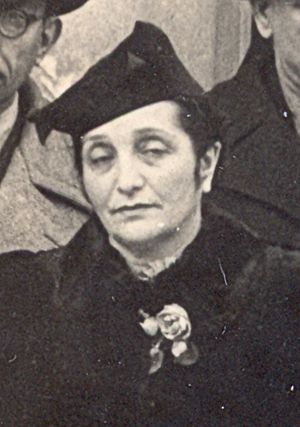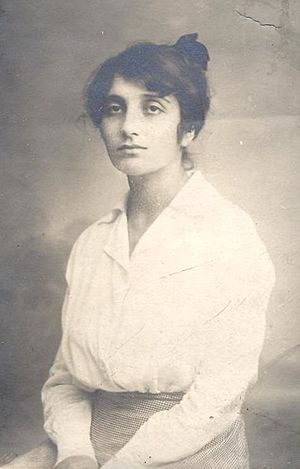Dora Gabe facts for kids
Quick facts for kids
Dora Gabe
|
|
|---|---|

Dora Gabe, before 1939
|
|
| Born | 16 August 1888 Dabovik, Bulgaria |
| Died | 16 November 1983 (aged 95) Sofia, Bulgaria |
| Occupation | Poet |
| Language | Bulgarian |
| Nationality | Bulgarian |
| Alma mater | Sofia University, University of Grenoble, University of Geneva |
| Genre | Poetry |
Dora Petrova Gabe (born August 16, 1888 – died November 16, 1983) was a famous Bulgarian Jewish poet. She wrote many different kinds of books. These included poems for both kids and adults. She also wrote travel books, short stories, and essays. Later in her life, Dora Gabe spent a lot of time translating books from other languages.
Contents
About Dora Gabe
Dora Gabe's father, Peter Gabe, was an immigrant from Russia. He was the first Jewish person to be elected to the National Assembly in Bulgaria. This is like the country's main parliament or government meeting place.
Dora went to high school in Varna. After that, she studied science at Sofia University in 1904. She then went on to study French in Geneva and Grenoble from 1905 to 1906. She even taught French in Dobrich in 1907.
Dora Gabe loved working with children's books. In 1925, the Ministry of Education in Bulgaria asked her to edit a special series. It was called "Library for the youngest." She also worked as an editor for a children's magazine called "Window" from 1939 to 1941.
Dora Gabe helped start important groups. She was one of the people who created the Bulgarian-Polish Committee in 1922. She also helped found the Bulgarian PEN Club in 1927. The PEN Club is a worldwide group for writers. She was the president of the Bulgarian PEN Club for a long time.
From 1947 to 1950, she worked for cultural affairs at the Bulgarian Embassy in Warsaw. She also represented Bulgaria at international meetings for PEN clubs.
In 1968, Dora Gabe was given a special honor. She was named "Honorary citizen of the city Tolbuhin" (now called Dobrich).
Many people in Bulgaria think she is one of their best poets. They love her not just for her writing. They also admire her deep respect for all types of art and her kind, giving spirit.
Her Writing Career
Dora Gabe started her writing journey early. In 1900, she published one of her first poems. It was called "Spring" and appeared in a journal named "Youth" in Shumen. Soon after, she published more poems. These appeared in magazines like "Thought" and "Democratic Review" between 1905 and 1906. This was the real start of her career as a writer.
In the 1920s and 1930s, Dora Gabe was very busy. She published many poems for both adults and children. She also wrote travel stories, short stories, and essays. She even wrote reviews about theater and articles about literature. Her works appeared in many different magazines. Some were for adults, like "Contemporary Thought" and "Zlatorog." Others were for children, such as "Firefly" and "Children's joy."
After 1944, her works were published even more widely. They appeared in popular Bulgarian newspapers and journals. She also wrote for children's magazines like "Nightingale" and "Squad."
Her first book of poems was called "Violets." It showed her deep feelings and understanding of symbolism. This was an art movement where artists used symbols to express ideas.
Dora Gabe's works have been translated into many languages. People in countries like Argentina, Germany, Russia, and France can read her books.
Dora Gabe as a Translator
From 1917 until the end of her life, Dora Gabe was very active in translation. This means she changed books and poems from one language into another. She was very good at languages. She spoke Polish, Czech, Russian, French, and Greek fluently.
She translated works by many famous writers. Some of these included Adam Mickiewicz, Maria Konopnicka, and Julian Tuwim. She helped Bulgarian readers enjoy stories and poems from other countries.
Some of her most famous translations include:
- A series of books called "Polish poets" (1921).
- "Anthems" by Ian Kasprovich (1924).
- "Angel" by J. Słowacki (1925).
Works in English
- Dora Gabe (1978). Depths: conversations with the sea. Hounslow Press. ISBN 978-0-88882-035-8. https://books.google.com/books?id=IwEHAQAAIAAJ. Retrieved 21 August 2013.
Awards and Honors
Dora Gabe received many awards for her amazing work:
- 1927: Golden Cross for Merit from Poland.
- 1929: An honorary diploma from the Peace Council.
- 1946: The "9th of September 1944" order, third degree.
- 1963: An award from the Coalition of Bulgarian Writers for her poem "Homeland."
- 1966: Honored with the title "Marked agent of culture" for her poetry.
- 1968: Received the "George Dimitrov" order for her 80th birthday.
- 1969: Honored with the title "Gifted agent of culture."
- 1972: An honorary diploma for her story "Mother Parashkeva."
- 1978: Awarded the "Laureate of Dimitrov's Award" for her poem collections. These included "Wait Sun," "Depths," and "The Thickened Silence."
- 1978: Honored with the title "Hero of the socialist effort" for her 90th birthday.
- 1978: Received the honorable sign of Sofia, first degree.
- 1979: A special award from the Union of Bulgarian Composers for her poem "Headstrong."
- 1979: Received the "Petko Rachov Slaveikov" award. This was for her great contributions to children's and young people's literature.
Images for kids
See also
 In Spanish: Dora Gabe para niños
In Spanish: Dora Gabe para niños



